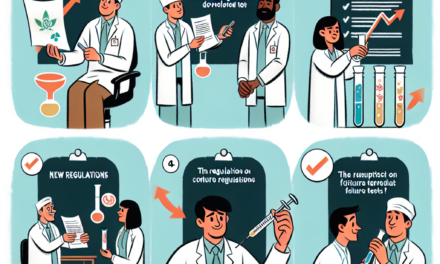FTC Cautions 21 Healthcare Marketers on Misleading Claims
The Federal Trade Commission (FTC) has recently taken significant action against 21 healthcare marketers for making misleading claims about their products and services. This move underscores the importance of truthfulness in advertising, especially in the healthcare sector, where consumers rely heavily on accurate information to make informed decisions about their health. In this article, we will explore the implications of the FTC’s actions, the nature of the misleading claims, the regulatory framework governing healthcare marketing, the impact on consumers, and the future of healthcare advertising.
Understanding the FTC’s Actions
The FTC’s recent warning to 21 healthcare marketers is part of a broader initiative to ensure that advertising in the healthcare sector is truthful and not misleading. The agency’s actions are rooted in its mandate to protect consumers from deceptive practices and to promote competition in the marketplace.
In this case, the FTC identified several marketers who were making unsubstantiated claims about their products, which included dietary supplements, medical devices, and other health-related services. These claims often suggested that the products could treat or prevent serious health conditions without providing adequate scientific evidence to support such assertions.
For instance, some marketers claimed that their supplements could cure diseases like diabetes or cancer, while others suggested that their medical devices could provide miraculous health benefits. The FTC’s warning serves as a reminder that all health-related claims must be backed by credible scientific evidence, and marketers must be prepared to substantiate their claims if challenged.
The Nature of Misleading Claims
Misleading claims in healthcare marketing can take many forms, and understanding these is crucial for both consumers and marketers. The FTC has outlined several common types of misleading claims that have been observed in the healthcare sector:
- Unsubstantiated Health Claims: These are claims that suggest a product can treat, cure, or prevent a disease without scientific evidence to back them up.
- False Testimonials: Some marketers use testimonials from individuals who claim to have experienced miraculous results from a product, often without disclosing that these testimonials are not representative of typical results.
- Misleading Comparisons: Marketers may compare their products to competitors in a way that is misleading or not based on fair comparisons.
- Omission of Risks: Some advertisements fail to disclose potential risks or side effects associated with a product, leading consumers to believe that the product is safer than it actually is.
- Exaggerated Benefits: Claims that exaggerate the benefits of a product can mislead consumers into believing that they will achieve results that are unlikely or impossible.
These misleading claims can have serious consequences for consumers, who may invest in products that do not deliver the promised results or, worse, may put their health at risk by relying on unproven treatments.
The Regulatory Framework Governing Healthcare Marketing
The FTC operates under a well-defined regulatory framework that governs advertising practices across various industries, including healthcare. The primary legislation guiding the FTC’s actions is the Federal Trade Commission Act, which prohibits unfair or deceptive acts or practices in commerce.
In addition to the FTC Act, healthcare marketers must also comply with other regulations, including:
- The Food, Drug, and Cosmetic Act (FDCA): This act regulates the safety and efficacy of drugs and medical devices, requiring that any claims made about these products be substantiated by scientific evidence.
- The Dietary Supplement Health and Education Act (DSHEA): This act provides a framework for the regulation of dietary supplements, including guidelines for labeling and health claims.
- The Health Insurance Portability and Accountability Act (HIPAA): While primarily focused on patient privacy, HIPAA also impacts how healthcare marketers can use patient testimonials and other personal health information in their advertising.
Marketers must navigate this complex regulatory landscape to ensure compliance while effectively promoting their products. Failure to do so can result in significant penalties, including fines and restrictions on advertising practices.
The Impact on Consumers
The FTC’s actions against misleading healthcare marketing have far-reaching implications for consumers. When marketers make false or misleading claims, it can lead to a range of negative outcomes, including:
- Financial Loss: Consumers may spend money on products that do not deliver the promised benefits, leading to financial strain.
- Health Risks: Relying on unproven treatments can result in worsening health conditions or adverse effects from ineffective products.
- Misinformed Decisions: Misleading claims can lead consumers to make poor health choices based on inaccurate information.
- Erosion of Trust: When consumers encounter misleading claims, it can erode their trust in legitimate healthcare products and services.
- Increased Skepticism: Consumers may become skeptical of all health-related claims, making it difficult for reputable marketers to communicate the benefits of their products.
To mitigate these risks, consumers must be vigilant and critical of the claims made by healthcare marketers. They should seek out credible sources of information, consult healthcare professionals, and be wary of products that promise miraculous results without scientific backing.
The Future of Healthcare Advertising
The landscape of healthcare advertising is evolving, driven by technological advancements, changing consumer behaviors, and increasing regulatory scrutiny. As the FTC continues to crack down on misleading claims, marketers must adapt their strategies to align with best practices and regulatory requirements.
Some key trends shaping the future of healthcare advertising include:
- Increased Transparency: Marketers will need to provide clear and transparent information about their products, including potential risks and limitations.
- Emphasis on Evidence-Based Marketing: There will be a growing demand for evidence-based marketing practices, where claims are substantiated by credible scientific research.
- Digital Marketing Regulations: As digital marketing continues to grow, regulators may introduce new guidelines to address the unique challenges posed by online advertising.
- Consumer Education: Marketers will need to invest in consumer education initiatives to help individuals make informed decisions about their health.
- Collaboration with Healthcare Professionals: Building partnerships with healthcare professionals can enhance credibility and ensure that marketing messages are aligned with best practices.
As the healthcare landscape continues to evolve, marketers must prioritize ethical practices and consumer trust to succeed in a competitive marketplace.
Conclusion
The FTC’s cautionary actions against 21 healthcare marketers serve as a critical reminder of the importance of truthfulness in advertising. Misleading claims can have serious consequences for consumers, leading to financial loss, health risks, and erosion of trust in legitimate healthcare products. As the regulatory landscape continues to evolve, marketers must adapt their strategies to prioritize transparency, evidence-based practices, and consumer education.
Ultimately, the future of healthcare advertising will depend on the ability of marketers to navigate the complex regulatory framework while providing accurate and reliable information to consumers. By doing so, they can foster trust and contribute to a healthier marketplace for all.





